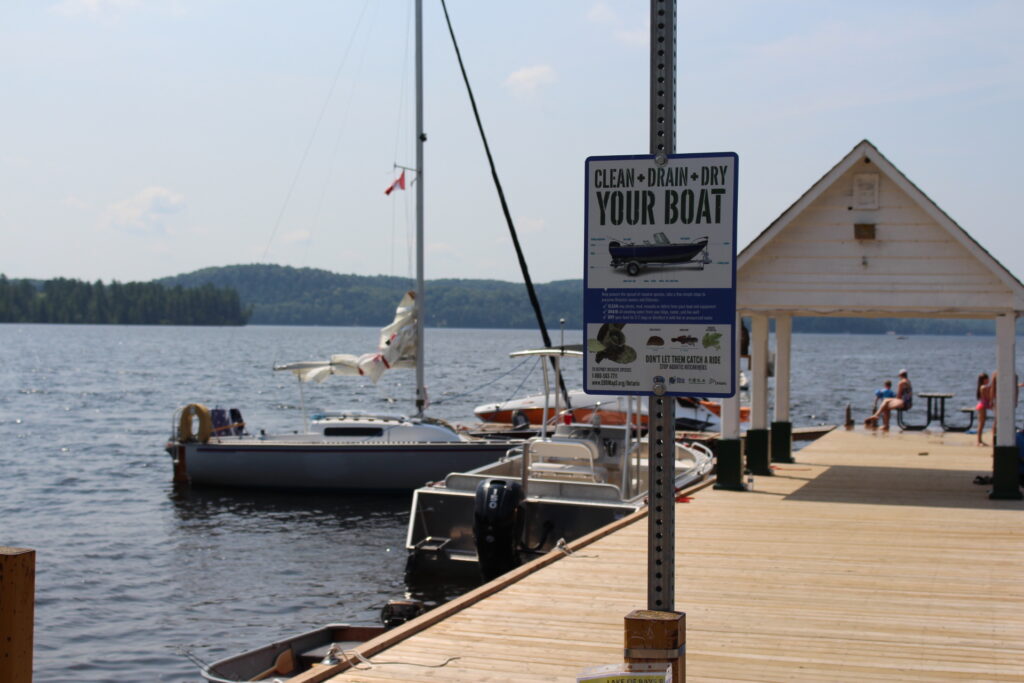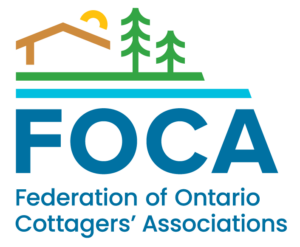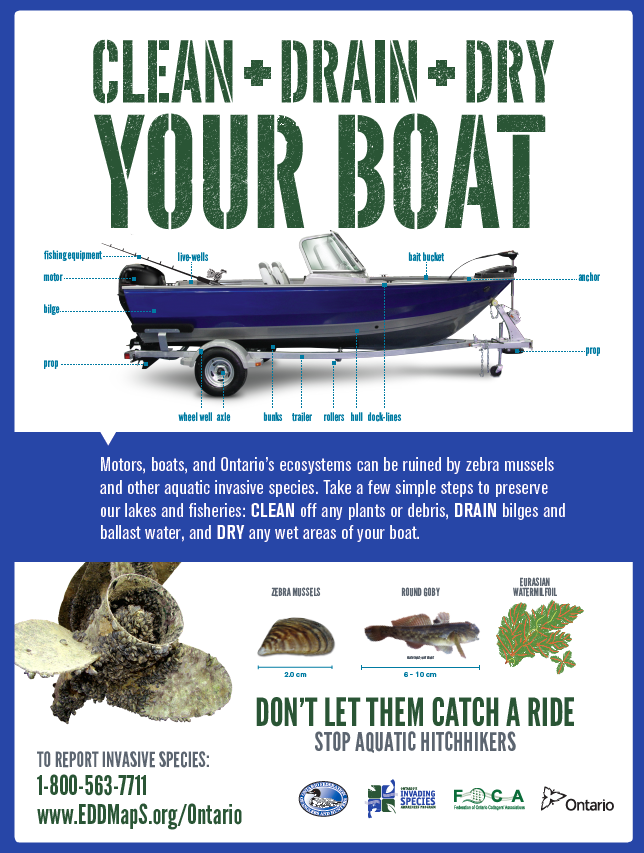
We have a shared responsibility as boaters to keep our waterways safe and clean.
We are lucky to have thousands of beautiful lakes and rivers to enjoy in Ontario, and boating is an important part of our heritage and history. Boating allows for an appreciation of our natural areas, and can be a great family activity.

Update January 6, 2026 – Small Vessel Licensing Regulations: Transport Canada (TC) has implemented a new 5-year license period for pleasure craft licenses (PCL) with a $24 service fee to process new, renewed, or transferred PCL applications. There are new requirements to notify TC of changes in boat information or ownership within 30 (not 90) days.
IMPORTANT NOTE: This is different than the ‘Pleasure Craft Operator Card’ that is issued in your name; this is for your boat(s). A copy of the PCL must be carried on board at all times. If you have a boat that was licensed in 1974 or earlier, you must ‘renew’ by March 31st this year, or face fines. If licensed between 1975 and 1985, you have until the end of 2026, etc. Get all the details – including a renewal deadline chart by boat license date – from our colleagues at CanBoat.
July 2025 – The University of Minnesota‘s St. Anthony Falls Laboratory has released a study that examines how wake from different recreational boats affects lakebeds and the water column. The related underwater videos provide dramatic evidence! (source of the image stills at the side) Read the study abstract and download the videos from a link at the end of the overview, or watch them on YouTube here.
Learn more about wake impacts from FOCA, below.
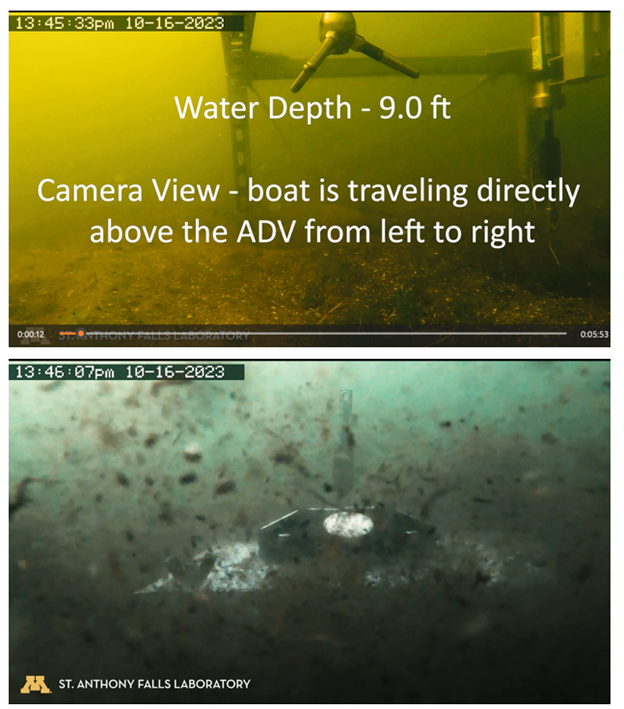
Transport Canada Policy Updates:
On behalf of our members across the Province, FOCA sits on the Ontario Recreational Boating Advisory Committee (ON-RBAC) of Transport Canada (TC).
August 13, 2025 – Transport Canada announced the new Regulations Amending the Vessel Operation Restriction Regulations (VORR) have come into force. FOCA has kept members updated since 2022 on this effort to streamline the VORR process.
Members can login below for additional TC updates about vessel restrictions, mandatory PFDs and more:
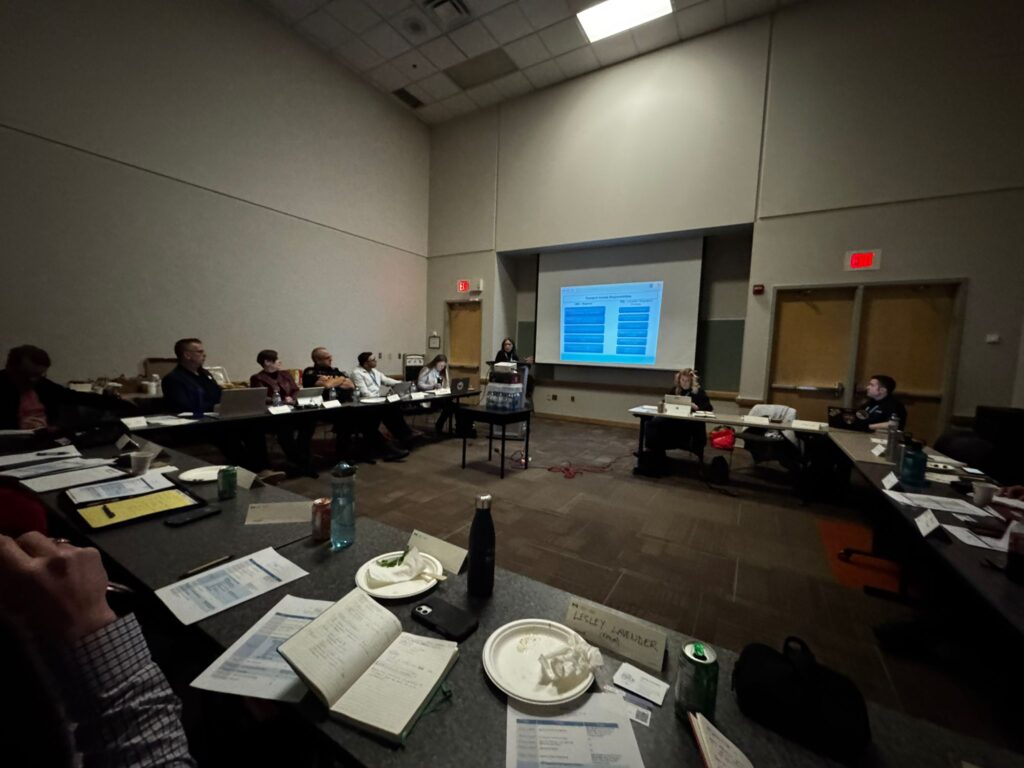
You're missing members-only content!
The following updates are only available to members of our Member Associations, and annual supporters.
If you are already registered on the FOCA website, please login below with your Username and Password.
Need help with your login? Contact us for assistance during business hours. Not yet a Member Association? Find out why you should be!
May 17 – 23, 2025 is Safe Boating Awareness Week, an ongoing initiative of the Canadian Safe Boating Council (CSBC) to reduce accidents, injuries and fatalities among boaters. Find important information including video tips about large and small craft safety from CSBC’s website.
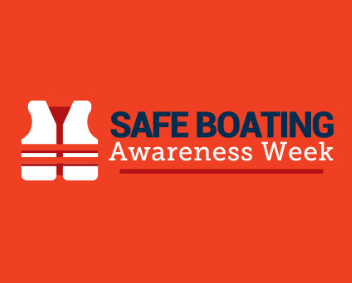
April 2025 – as we gear up for another boating season, our partners at the Canadian Safe Boating Council remind everyone that boating safety education is crucial to prevent drowning. Learn about the gasp reflex caused by sudden water immersion. Visit “The Shock Factor” webpage, and download a project summary to share at your lake this season.
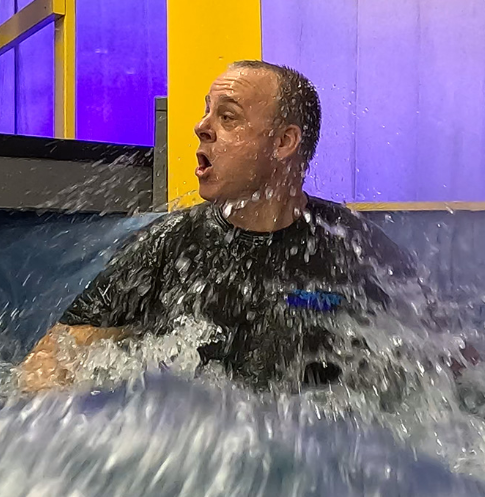
October 2024 – the latest edition of LakeLine, the publication of the North American Lake Management Society (NALMS, of which FOCA is a member), is dedicated to the topic of ballast boats and related wake and invasive species impacts. NALMS subscribers can read the Fall 2024 edition online here.
March 2024 – CD3 Systems, one of FOCA’s valued Corporate Sponsors, has launched a new “Check-In, Check-Out” boat cleaning instructions APP to help prevent the spread of invasive species. Download a 3-page information package about the free CICO Program (PDF) and how you could use it at your local boat launch.
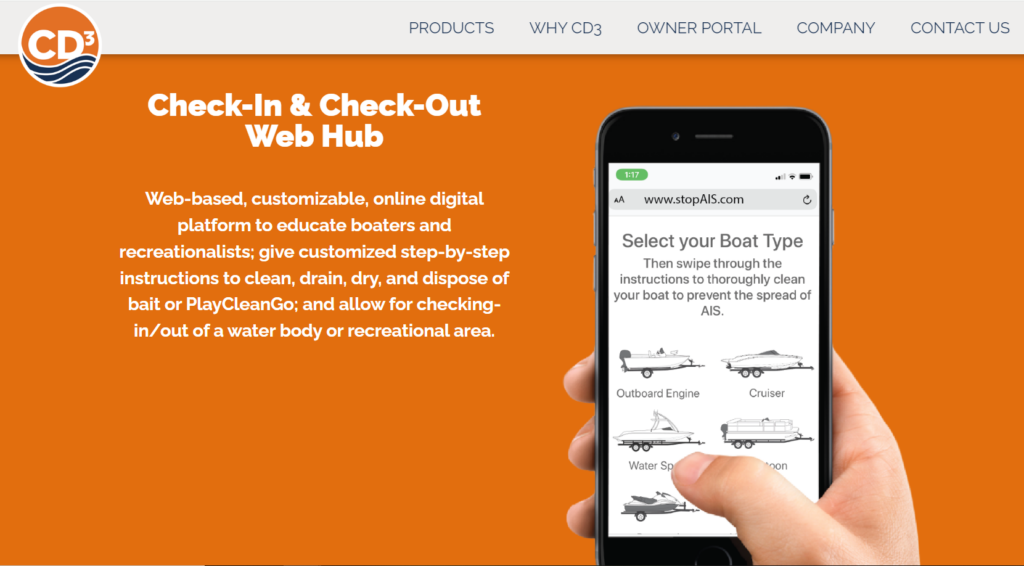
May 31, 2024 – FOCA’s colleagues at CanBoat (formerly called the Canadian Power and Sail Squadron) announced that Transport Canada (TC) is no longer funding the longstanding Safety Education & Flare Disposal Program. According to CanBoat, the funding (previously provided through the TC Boating Safety Contribution Program) was used to cover the cost of flare shipping and disposal, insurance and other related expenses; without it, the program cannot continue. Read more about this development by clicking here.

FOCA reminds everyone that while enjoying our waterways can be a wonderful outdoor experience, it is important to be vigilant while having fun.
Lakes and rivers can be unpredictable and also quite busy during the peak summer season in Ontario. Boaters can ensure a safe experience for all by being prepared, paying attention while under way, and observing the rules of the ‘road’.
FOCA supports the safe and responsible operation of all watercraft and other related activities by:
- promoting education and communication on boating issues
- partnering with organizations to provide boater education
- alerting cottagers about general boating safety and related issues.
How can you help prevent the spread of invasive species in cottage country?
Some general best practices are:
- garden using only non-invasive plants
- dispose of bait properly
- buy firewood locally
- inspect and clean your boat & motor when changing water bodies (it’s the law)
Members: contact the office for copies of signs you can post at public boat launches.
Learn more on FOCA’s Invasive Species webpage!

Next: Clean & Drain & Dry your watercraft before moving between waterbodies. Don’t spread invasive species! Learn how by downloading a copy of the Province’s Guidance for Watercraft Users (PDF, 12 pages) with best management practices to prevent the spread of aquatic invasive species.
Also: Join our campaign to Be #WakeAware by reducing near-shore wake to protect loon nests, swimmers and kayakers, and to reduce shoreline erosion. Watch the video at the side, and please share this message!
Members: login (below) and click here to learn more about wake impacts.
Heading out on your boat? Follow these tips
- Review the Transport Canada Safe Boating Guide (pdf; 79 pages) which includes a “pre-departure checklist” and detailed descriptions of the safety equipment required on various types of vessels. (Note: there are even requirements for Stand Up Paddleboards > visit Paddle Canada for more details.)
- Next, read these quick tips from FOCA: Boating Tips to Prevent the Spread of Invasives! (pdf, 1 page)
- And REMEMBER your Pleasure Craft Operator Card: Everyone who operates a power-driven boat needs proof of competency — something that shows they understand the basic rules and how to safely operate a boat. The most common proof of competency is the Pleasure Craft Operator Card. You can get the card by taking a boating safety course in-person or online, and passing the test at the end of the course. Read more from Transport Canada’s Question & Answer webpage.
Public Resources:
- OPP’s Boat Notes brochure (download pdf; 2 pages)
- FOCA’s Cold Water Immersion Info (pdf; 1 page)
- Safety on the Water (online, Ontario Ministry of Transport)
- Boating Safety Tips: Boater Education & Resources (online, Discover Boating)
- What to do if you’re involved in a boat crash (online, Cottage Life, 2021)
- Transport Canada website
- also, check out all the resources available online here: www.csbc.ca.
Aug 23 2023 – Avoid Boating Tragedy (video posted to YouTube) – a webinar hosted by FOCA members the Muskoka Lakes Association, and our friends at Safe Quiet Lakes, with boating statistics from the Ontario Provincial Police

FOCA Association Members & “Friends of FOCA” (our annual supporters) can login below to access more resources and important updates, such as:
- May/July 2023 public comment period on new proposed vessel licensing regulations including introducing a $24 fee for an initial (new), renewal, transfer, or a replacement pleasure craft license
- January 2023 updates from Transport Canada about upcoming wake surfing restrictions and possible mandatory PFD wear
- June 2021 update about the proposal to require more substantial proof of operator competency than the current “Rental Boat Safety Checklist”
- what to do (and who to call) if you find a wrecked or abandoned boat
- more about wake awareness
- FOCA’s tip sheet about in-water Shoal and Hazard Marking: Q&A and important risk management considerations for association that mark in-water hazards
- boating safety statistics from a talk by the OPP Provincial Marine Coordinator at FOCA’s 2020 Fall Seminar for Lake Associations.
You're missing members-only content!
The following boating resources (listed above) are only available to members of our Member Associations.
If you are already registered on the FOCA website, please login below with your Username and Password.
Need help with your login? Contact us for assistance during business hours. Not yet a Member Association? Find out why you should be!
Wake Impacts & Wake Awareness:
June 4, 2025 – Wake up: the impact of boats on our lakes (Haliburton Echo)
April 30, 2025 – Boat wakes aren’t just a nuisance, they harm freshwater shorelines and wildlife (Dr. Chris Houser; The Conversation) > see below a 2024 presentation by Dr. Houser on this material:
July 2024 – FOCA’s partners at Safe Quiet Lakes held a webinar featuring new wake impact research from Dr. Chris Houser of the University of Waterloo about “Relative Energy and Perceived Impact of Vessel-Generated Waves in Fetch-Limited Environments.” Watch the webinar recording on YouTube.
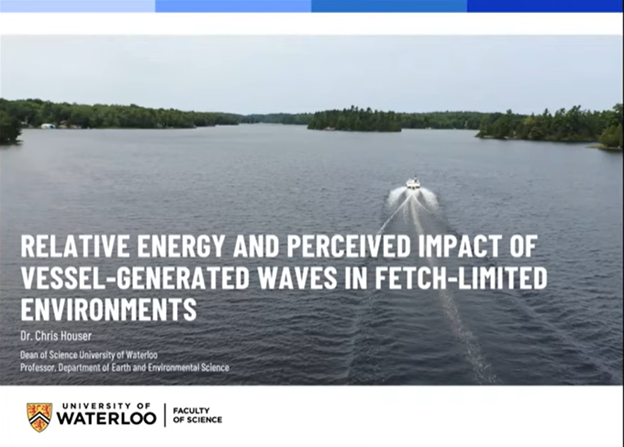
April 2024 – in the US state of Maine, a wake impact bill was enacted on April 3, 2024 with provisions including a 300-foot minimum distance from shore and a 15-foot minimum depth of lake for all wake surfing activities. Additionally, boat dealers are required to inform purchasers about education opportunities. Read more online from the regional organization in Maine called Lakes Environmental Association.
February 2023 – read more from the Georgian Bay Biosphere about 2022 wake research undertaken by Dr. Chris Houser (University of Windsor) on Muskoka lakes, and his plans for more study in 2023 on Lake Manitouwabing.
July 2022 – wake developments and research, as reported by FOCA’s partners at Safe Quiet Lakes:
- Tennessee (USA) became the first state to pass a watersport law, effective July 1, that specifically addresses wakesurfing and wakeboarding and distance from shores
- Quebec homeowners along Montreal’s South Shore of the St. Lawrence River have launched a $50-million class action lawsuit against the federal government that alleges they have experienced worsening shore erosion than would have occurred through natural processes due to ships
- In February, the University of Minnesota released the findings of research on waves produced by four recreational boats — two wakesurf boats and two typical recreational boats – that determined wakeboat waves were stronger and more forceful, and required distances greater than 500 feet from shore to dissipate.
August 24, 2021 – The risk of “rock ‘n’ roll” boating (Boating Industry Canada)
August 11, 2021 – Battling the speeding boats and big wake problem – (Cottage Life; updated from 2020 posting) including a link to a new podcast “Slow your boats” with the president of Safe Quiet Lakes
August 10, 2021 – Federation of Ontario Cottagers’ Associations raise awareness on boat wake damage (MyBancroftNow.com; also posted to MyMuskokaNow.com)
July 6, 2021 – Do we need laws to control excessive boat wakes? (Cottage Life)
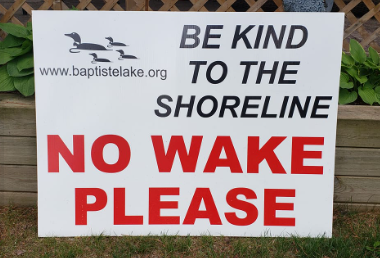
June 2021 – FOCA member group, the Baptiste Lake Association has created their own sign (pictured at the side) to encourage good wake etiquette on their lake! This picture was copied from Facebook, where they posted about their sign project.
June 13, 2021 – Water fight: Why wakesurf boats are making waves in cottage country (Ottawa Citizen)
As reported in the Spring 2021 edition of “Shorelines”, the newsletter of the Muskoka Lakes Association (MLA):
The MLA began a pilot project last summer that involved providing, at member request, a no wake sign suitable for placement on private property. This project was an expansion of Safe Quiet Lakes’ (SQL) Wakes and Speeds Traffic Calming project that started last spring on the Indian River/Mirror Lake. … We feel the no wake signs will indeed promote awareness and be a great tool to encourage traffic calming in areas of our lakes that need it most. In Muskoka a vessel must limit its speed to 9 KMH within 30 m of the shore or of a dock, pier, raft, floating platform or another vessel that is anchored, moored or underway, and does not apply to a vessel moving perpendicularly away from the shore while it is being used for water skiing or kite flying while the water skier or kite flyer is in the process of taking off. If you are interested in getting your very own co-branded MLA/ SQL No Wake sign, please use one of the following options to purchase your sign for $20.00 each and arrange for a contactless pick up! Call the MLA office at 705-765-5723, email info@mla.on.ca or purchase in the MLA online store: https://www.mla.on.ca/. Should you want your sign shipped to you, we are happy to do this, however postage fees will apply.
August 2020 – Safe Quiet Lakes hosted a webinar with Transport Canada about Signs and Buoys (YouTube; 1 hour)
July 2020 – Safe Quiet Lakes hosted a webinar with the Muskoka Lakes Association on the subject of wakes, speed and noise (YouTube; 30 minutes)
Avoid the Shore – Ride the Core – A campaign from Idaho, U.S. where they urge “Love your Lake – Watch your Wake!”
Shoal & Hazard Marking:
Watch Your Wake: Click below to read the document, provided with permission from FOCA members Pike Lake Community Association in Tay Valley Township, via the Lake Networking Group in Eastern Ontario: Watching Your Wake (pdf; 5 pages)
We encourage you to share the information with other interested groups (please credit FOCA and the Pike Lake Community Association). This is a timely reminder about being courteous and safe on the water, and a great example of grassroots “R and D” and sharing good information within the waterfront community! Watching Your Wake (pdf; 5 pages) – please credit FOCA and the Pike Lake Community Association (2013)
If you intend to place a buoy or marker or sign “in-water” (rather than just on land), you need to conform to Transport Canada‘s standards for buoys. Refer to the comprehensive digital guide: An Owner’s Guide to Private Buoys (download PDF, 28 pages).
February 2024 – A FOCA member told us that Transport Canada (TC) had contacted them about a non-compliant in-water buoy/sign they had placed, stating “No Wake.” They were directed by TC to remove it, as there is no such designation under TC regulations.
FIND OUT WHAT OUR MEMBER DID NEXT, AND ACCESS ADDITIONAL SHOAL & HAZARD MARKING RESOURCES, BY LOGGING IN:
You're missing members-only content!
The following resources about SHOAL & HAZARD MARKING are only available to members of our Member Associations.
If you are already registered on the FOCA website, please login below with your Username and Password.
Need help with your login? Contact us for assistance during business hours. Not yet a Member Association? Find out why you should be!

Please note: the following is archival material, and some links to third-party resources may no longer be active.
Earlier Transport Canada Policy Updates:
September 6, 2024 – Transport Canada (TC) has opened a public consultation on the question of mandatory PFD wear for recreational boaters. Learn more and make your comment by November 4, 2024.
At FOCA’s 2024 Spring Seminar, Sgt. Dave Moffatt of the Marine Unit of the OPP gave a slide presentation about PFDs and fatality rates: Review the slides (download PDF, 4 MB)
July 5, 2024 – Transport Canada (TC) has released the results of their analysis of public feedback on the proposed modernization of the Vessel Operation Restriction Regulation (VORR), and issues associated with long-term anchoring of floating accommodations, each of which FOCA had encouraged members to comment upon. TC has announced there will be a second consultation period on the issue of floating accommodations “in summer 2024”. [Update: nothing has been seen yet as of Sept. 2024.] Ensure you are subscribed to FOCA’s Elert (e-newsletter), where we will provide updates. Get background on these topics below and on FOCA’s Floating Accommodations webpage.
March 8, 2024 – Parks Canada opens public consult period on a Notice of Mooring Restrictions related to floating accommodations (see more on that subject on this FOCA webpage) that is planned to come into effect on May 1, 2024 on the Trent-Severn Waterway. Add your comments by April 7, 2024.
January 2024 – FOCA sits on the Ontario Recreational Boating Advisory Committee (ON-RBAC) of Transport Canada (TC), and participated in recent meetings. Our members will be interested in developments on several TC topics, including these:
- a public comment period took place in December 2023 on the topic of modernizing TC’s Vessel Operation Restriction Regulations (VORR), in hopes of speeding up the process for requests and implementation which can currently take years. To learn more about the VORR process as described by TC, watch a 2020 webinar (posted to YouTube) from our colleagues at Safe Quiet Lakes.
- a new consultation and survey related to Long-term Anchoring notes that TC has heard recently that having “vessels anchored long-term for recreation has raised concerns about the environment, safety, and public access”, and asking the public if TC should consider regulating them (possibly through the VORR mechanism); public comment period ended in December 2023
- mandatory PFD (personal floatation device) wear is still being contemplated by TC, with possible thresholds including age (children vs. adults), vessel type (powered or not), and vessel size (under or over 6 metres) under consideration. We expect to hear more in mid-2024 about a public comment period on this subject.
- changes to Pleasure Craft Licensing Fees went through public consultation in 2021-22, as described in TC’s “What we heard” summary. Fees to renew vessel registrations would be payable every 5 years. This change, and an opportunity to further comment, will occur when posted in Canada Gazette, Part I, likely in mid-2024. Stay tuned to the FOCA Elert for updates!
December 2023 – FOCA submitted comments to Transport Canada’s “Let’s Talk Transportation” public comment period about: (1) the Vessel Operation Restriction Regulations modernization process, and (2) the issue of long-term anchoring – or what we have been referring to as floating accommodations. Read FOCA’s submission (PDF, 3 pages)
Transport Canada (TC) launched a “Let’s Talk” web portal to collect public comments about possible changes to small vessel (boat) noise emissions. This consultation closed May 13, 2023.
Since 2019, the Decibel Coalition has been working to address growing concerns about excessively loud boats. This national Coalition has been lobbying TC to enhance existing Small Vessel Regulations to include decibel limits on boat motor noise, as many other jurisdictions around the world have done.
The Decibel Coalition is a project of Safe Quiet Lakes, and members include cottage associations, environmental groups and municipalities. See their online resources: How do I know if my boat is too noisy?
2020 Boating Stats from the OPP:
Sgt. Dave Moffatt, Provincial Marine Coordinator of the Ontario Provincial Police (OPP), spoke at FOCA’s 2020 Fall Seminar for Lake Associations about the pandemic boating season. Click to download a copy of the slides. Some highlights:
- boating traffic was up in summer 2020 (you weren’t just imagining that!)
- 58% of deaths occurred in “non Summer time” (=Sept.16 to June 14)
- 86% of deceased victims were NOT wearing a PFD.
November 2020 – Transport Canada’s Office of Boating Safety is considering changes to increase safety, environmental protection and to improve service delivery through several regulatory amendments to the Small Vessel Regulations (SVR):
- Changes to the Pleasure Craft Licensing Program include reducing the ten-year licenses to every five years ensuring that ownership information is updated more often. Also changing the registration fee from FREE to $15.
- Changes being considered for the Pleasure Craft Operators Card include strengthening course accreditation requirements, and repealing the provision for the Rental Boat Safety Checklist as being accepted as proof of competency.
Download related information here. (PDF, 2 pages)
What a 2018 vessel decision in trial involving drowned Muskoka boy means for Canadians – A case that impacts everyone, coast to coast (MuskokaRegion.com, December 2018)
Ethanol Education and Consumer Protection – Protect your marine engines! Purchasing ethanol-free marine fuel from a reputable marina is an important decision. Non-marine fuel can cause an engine problem that could leave boaters stranded and in danger unexpectedly.
Boating Partners & Colleagues:
FOCA sits as a member of the Ontario Recreational Boating Advisory Council (ONRBAC) which is a committee of Transport Canada, providing Transport Canada with advice on matters related to the safety of recreational boaters, the safe operation of recreational boats, the safe and environmentally friendly use of recreational waterways and any other issue of interest.
FOCA is also a proud member of the Canadian Safe Boating Council (CSBC).
In 2019, FOCA’s colleagues at the Canadian Safe Boating Council (CSBC) noted a decrease in boating-related drownings from 2012-2016, compared to the previous 5-year period. Some additional statistics: canoes were the second-most common vessel involved in boating-related drowning fatalities!, and wearing lifejackets at the time of an incident continues to be a deciding factor in survival rates. Read the full report (download PDF, 12 pages, 2019) from the Lifesaving Society.
“Safe Boating Awareness Week” is celebrated each year in May. Get tips from our partners at the Canadian Safe Boating Council (CSBC) and share the key messages:
- wear your lifejacket
- boat sober
- be prepared – you, and your boat
- take a boating course
- be aware of cold-water risks.
CSBC also reminds you to keep in mind physical distancing regulations, and when you should be – and not be – on your boat at this time. Here’s to a great season on the water! Here’s more on the topic from 2021, during the pandemic:
- Boating During COVID-19: Navigating Local Restrictions & Safe Social Distancing (link to online resources from Discover Boating and partners, including the image “Social Distancing When Boating” at the side)
August 19, 2020 – How this Temagami marina thrived during the pandemic (TVO)
Note that Kim Krech, owner of Temagami Marine, was part of TVO’s “COVID-19 Cottage Quandary” segment (aired May 4, 2020) alongside FOCA’s Terry Rees, and the Mayor of Township of Muskoka Lakes, Phil Harding
Parting thoughts from FOCA...
There are many things we can do to lower our impact as individual boaters such as make wise choices in marine power, and be sensitive to near-shore habitats. Keep in mind that conventional two-stroke marine engines in boats and personal watercraft emit proportionally more volatile organic compounds (VOCs) and other air pollutants than more fuel efficient, direct injection two-stroke and four-stroke engines.
Boat operation can also impact the sensitive shorelines, and can directly impact the success of important species, including the loon. Protecting loon nesting sites and nursery areas, especially during the breeding season, can make a difference. For boaters, we should be mindful of our wakes as they can impact wildlife, shoreline erosion as well as create considerable havoc on neighbouring boats and docks.
Enjoy your boating experience in a safe and responsible manner, and remember: Boating is Good for Your Health & Mind (Boating Ontario, 2021)
To learn about the canoe’s link to Canada’s rich cultural heritage and unique landscape, and discover the enduring significance of the canoe to the people of Canada, visit the Canadian Canoe Museum.
